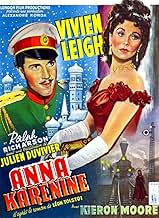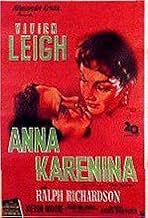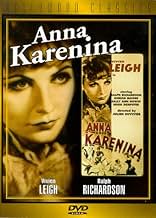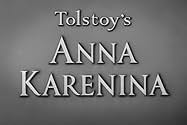AVALIAÇÃO DA IMDb
6,6/10
3,1 mil
SUA AVALIAÇÃO
Adicionar um enredo no seu idiomaA married woman's affair with a dashing young officer has tragic results.A married woman's affair with a dashing young officer has tragic results.A married woman's affair with a dashing young officer has tragic results.
- Direção
- Roteiristas
- Artistas
Niall MacGinnis
- Levin
- (as Niall Macginnis)
Avaliações em destaque
Count Tolstoy's massive novels, "War and Peace," and "Anna Karenina" are personally quite challenging.
Here are breathtakingly crafted literary works in a spiritual context of unconstructive energy. It's quite easy to become as entranced within these "worlds" as are many music lovers within the skewed terrain of Wagner's Valhalla and Nibelungens.
Tolstoy's words pull in the reader almost hypnotically as he spins his titanic, subtle tales of societal mores conflicting with human emotions.
Many of his characters are self-absorbed and vain, and his social environments repressive and stolid, with false values that tragically dehumanize and destroy.
So it's an ultimate challenge to attempt to separate these energetic downers from their dazzling technical counterparts.
In the case of "Anna," after stripping away the polished veneer, I find characters trying to cope with their testy emotional choices while being thwarted by inhuman societal standards.
Yet "Anna" is a favorite of filmmakers, having been done countless times, with the Garbo-Selznick version the most notable. Here Vivien Leigh gives a creditable performance of this distraught heroine, with Director Julien Duvivier joining Jean Anuith in script adaptation.
Ralph Richardson and Kieron Moore are both completely substantial, and general production values are attended to with solid professionalism.
Alas, the enactment seldom tugs heartstrings and, in fact, a strangely turgid pall seems to hang over the entire production. Condensing a 900-page novel down to 2-hour running time doesn't help matters.
As for Leigh, my feeling is that she gravitated too often to "fallen woman" roles. While she portrayed them very well, they may have failed to bring her the uplift her personality seemed to desperately seek. Hers was pretty much a career of depressingly joyless female characters, which perhaps worked not to her personal advantage.
That's another matter, though; Leigh was forever the consummate, fine actress, and her legacy is one of great artistic achievement.
This version of "Anna Karenina" remains a thoughtful, worthy attempt at a near-impossible task.
Here are breathtakingly crafted literary works in a spiritual context of unconstructive energy. It's quite easy to become as entranced within these "worlds" as are many music lovers within the skewed terrain of Wagner's Valhalla and Nibelungens.
Tolstoy's words pull in the reader almost hypnotically as he spins his titanic, subtle tales of societal mores conflicting with human emotions.
Many of his characters are self-absorbed and vain, and his social environments repressive and stolid, with false values that tragically dehumanize and destroy.
So it's an ultimate challenge to attempt to separate these energetic downers from their dazzling technical counterparts.
In the case of "Anna," after stripping away the polished veneer, I find characters trying to cope with their testy emotional choices while being thwarted by inhuman societal standards.
Yet "Anna" is a favorite of filmmakers, having been done countless times, with the Garbo-Selznick version the most notable. Here Vivien Leigh gives a creditable performance of this distraught heroine, with Director Julien Duvivier joining Jean Anuith in script adaptation.
Ralph Richardson and Kieron Moore are both completely substantial, and general production values are attended to with solid professionalism.
Alas, the enactment seldom tugs heartstrings and, in fact, a strangely turgid pall seems to hang over the entire production. Condensing a 900-page novel down to 2-hour running time doesn't help matters.
As for Leigh, my feeling is that she gravitated too often to "fallen woman" roles. While she portrayed them very well, they may have failed to bring her the uplift her personality seemed to desperately seek. Hers was pretty much a career of depressingly joyless female characters, which perhaps worked not to her personal advantage.
That's another matter, though; Leigh was forever the consummate, fine actress, and her legacy is one of great artistic achievement.
This version of "Anna Karenina" remains a thoughtful, worthy attempt at a near-impossible task.
Rumor had it that Vivien Leigh was not anxious to take on the remake of "Anna Karenina" partly because she had just recovered from tuberculosis, and maybe also because the ghost of Greta Garbo was too real. But she had one film left to do for Alexander Korda, and this was it. "Anna Karenina" released in 1948, stars Leigh as the tragic Anna. The story is based on Tolstoy's novel. Anna meets a handsome colonel, Count Vronsky (Kieron Moore) and falls in love with him. The trouble is, she is married to a high-level Russian bureaucrat (Ralph Richardson) and has a son. Anna's husband is a self-absorbed politician type, somewhat cold and aloof, consumed with his image in Russian politics. He sees marriage as a "duty" something he says a few times. Anna runs away with Vronksy, a horrendous scandal at the time and probably still would be today. It all ends tragically. Comparisons between this film and the 1935 one are inevitable. While both films are respectable, I prefer Viven Leigh's performance of Anna. Perhaps it was because Leigh had her own personal demons that she made this part so amazingly real, as she would in "A Streetcar named Desire" three years later. While I admire Garbo, I did not think of her as a great actress. Too aloof in some ways to believe she would fall head over heels for Vronsky. Ralph Richardson plays his part with consummate discipline; he can only see Anna's betrayal in terms of how it effects him. Kieron Moore is harder to judge. In the first part of the movie, he isn't given much to do except show off his good looks. He does, however, get a few good scenes as the movie progresses, and plays Vronksy as a decent man but also a flawed one. If you only know the 1935 version of this film, at least be open-minded enough to give this remake a chance. For me, Viven Leigh was reason enough for me to see it.
When Vivien Leigh did her version of Anna Karenina for the British cinema she had the advantage of a less stringent censorship in the UK than Greta Garbo had working for MGM in the Thirties. Garbo was hemmed in by restrictions that she had to be a wronged woman, seduced and abandoned by her lover, and committing suicide to also atone for her sins.
Vivien plays a woman who knows precisely what she was doing and yet she chose to flout the male dominated society of 19th Century Russia. Like Garbo she is married to a pill of a husband and when a dashing young cavalry officer shows his attentions to her, she falls madly in love.
It's pointed out to her at least once in the film that her biggest sin is a lack of discretion. But Vivien and Kieron Moore want the whole world to know what's going on with them. Like William Randolph Hearst and Marion Davies.
MGM softened the portrait of Count Vronsky in the Garbo version by making it an eagerness to get back into the military during war that causes the breakup. Here Kieron Moore is far less noble. Not a bad person but a weak one. His mother wants him to make a more advantageous marriage and not to a woman with a bad reputation even though he's the one who gave her the bad reputation.
There's also a cop out scene filmed by MGM where Vronsky played by Fredric March expresses remorse over Anna in the end. No such scene exists in this more realistic version.
Of course Ralph Richardson as the husband Karenin is just as big a pill as Basil Rathbone was back in 1935. A man quite full of himself in his high level job in the Czar's government, he only sees how Anna's betrayal is affecting him. Richardson is almost doing a dress rehearsal for his portrayal of Dr. Sloper in next year's The Heiress.
Vivien Leigh was unfairly compared to Greta Garbo back when this came out, unfairly I think because there's only one Garbo. Vivien was a frail creature in life and that helped in a lot of her work. Anna was a frail creature herself unable to stand up to the hypocrisy and the pressure of the society around her.
In fact Anna Karenina is a story of failure. Two people fall in love, one of them trapped in a loveless marriage, and attempt to flout society and they lose. Tolstoy sees all that and records it well, but offers no solution.
Women's liberation was off the radar in old mother Russia.
Vivien plays a woman who knows precisely what she was doing and yet she chose to flout the male dominated society of 19th Century Russia. Like Garbo she is married to a pill of a husband and when a dashing young cavalry officer shows his attentions to her, she falls madly in love.
It's pointed out to her at least once in the film that her biggest sin is a lack of discretion. But Vivien and Kieron Moore want the whole world to know what's going on with them. Like William Randolph Hearst and Marion Davies.
MGM softened the portrait of Count Vronsky in the Garbo version by making it an eagerness to get back into the military during war that causes the breakup. Here Kieron Moore is far less noble. Not a bad person but a weak one. His mother wants him to make a more advantageous marriage and not to a woman with a bad reputation even though he's the one who gave her the bad reputation.
There's also a cop out scene filmed by MGM where Vronsky played by Fredric March expresses remorse over Anna in the end. No such scene exists in this more realistic version.
Of course Ralph Richardson as the husband Karenin is just as big a pill as Basil Rathbone was back in 1935. A man quite full of himself in his high level job in the Czar's government, he only sees how Anna's betrayal is affecting him. Richardson is almost doing a dress rehearsal for his portrayal of Dr. Sloper in next year's The Heiress.
Vivien Leigh was unfairly compared to Greta Garbo back when this came out, unfairly I think because there's only one Garbo. Vivien was a frail creature in life and that helped in a lot of her work. Anna was a frail creature herself unable to stand up to the hypocrisy and the pressure of the society around her.
In fact Anna Karenina is a story of failure. Two people fall in love, one of them trapped in a loveless marriage, and attempt to flout society and they lose. Tolstoy sees all that and records it well, but offers no solution.
Women's liberation was off the radar in old mother Russia.
It has always struck me as a pity that whenever film versions of "Anna Karenina" are discussed it is Greta Garbo's of 1935 that excites critical attention rather than Vivien Leigh's. I suppose this is inevitable given that Garbo's is the more memorable performance, but in all other respects I find Julien Duvivier's 1948 version the finer film. It was the first one I saw and got to know really well, so much so that when I finally caught up with the Clarence Brown film I loathed it by comparison. It somehow epitomised the worst of M-G-M by being so studio bound and schmaltzy whereas Duvivier seemed to have made every effort to give his a feeling for 19th century Russian atmosphere. Andrej Andrejew's art direction had a real period sense of style and the music score by Constant Lambert with its echoes of "The Five" was a world away from the Herbert Stothart syrup. But by far the biggest plus of the 1948 version is the magisterial performance by Ralph Richardson as Karanin which stands beside his other two great roles of the same period, that of Dr Sloper in "The Heiress" and Baines the butler in "The Fallen Idol". His Karenin is not the arrogant brute of Basil Rathbone's (too close to his Murdstone in "David Copperfield" made in the same year) but a deceived husband evoking pity through his inability to be loved. Even Kieron Moore's rather colourless Vronsky scores over Frederic March's as it suggests the character's innate weakness rather than his romantic dash. If the Duvivier film has a serious flaw it is the rather prissy "upper class" delivery of dialogue by the female characters. Even Vivien Leigh's Anna suffers from this. I have a theory that the fault may lie in Duvivier as I have noticed repeatedly how directors whose native language is not English fail to control the nuances of speech when directing an English language film. Antonioni's "Blow Up" and the dialogue of Harvey Keitel in "Angelopoulos's "Ulysses Gaze" are examples. Interestingly the version recently shown on the British Carlton Films TV channel restored an additional 15 minutes to the version I had previously known, mainly early scenes that established minor characters with greater clarity. However the most significant restoration was a closing shot held considerably longer, thus giving that additional weight to the final tragedy that a really thoughtful director of Duvivier's calibre must have originally intended.
There is very little to find fault with in this screen update of Tolstoy's classic story. Vivien Leigh is near perfection as the main character. What makes this film work is the way our tragic heroine is shown in relation to the elements that surround her: the scenes of train journeys in winter to and from Russia; and the warm weather and grandeur of a summer spent in Venice.
The supporting players are very effective and match Miss Leigh's talents in the most important scenes. The moment where Anna breaks in to see her son who has been told she died should not be missed. But the single greatest aspect of this film is the inner journey this character takes, as envisioned by Tolstoy. It is a harrowing confrontation of one's fate and delivered bravely as only this classic actress can.
The supporting players are very effective and match Miss Leigh's talents in the most important scenes. The moment where Anna breaks in to see her son who has been told she died should not be missed. But the single greatest aspect of this film is the inner journey this character takes, as envisioned by Tolstoy. It is a harrowing confrontation of one's fate and delivered bravely as only this classic actress can.
Você sabia?
- CuriosidadesVivien Leigh's costumes were made in Paris by Barbara Karinska to Cecil Beaton's designs. She was in such pain wearing them that she even went to her doctor fearing she had broken her ribs. It was subsequently discovered that the dresser had been putting the corsets on upside down.
- Citações
Anna Karenina: My dear Korsunsky, you know very well I never dance unless I can help it.
- Cenas durante ou pós-créditosClosing credits: "And the light by which she had been reading the book of life, blazed up suddenly, illuminating those pages that had been dark, then flickered, grew dim, and went out forever".
- Versões alternativasU.S. release version runs approximately 112 minutes. This is the version issued by Fox DVD in 2007.
- ConexõesFeatured in Vivien Leigh: Scarlett and Beyond (1990)
Principais escolhas
Faça login para avaliar e ver a lista de recomendações personalizadas
Detalhes
- Data de lançamento
- País de origem
- Central de atendimento oficial
- Idiomas
- Também conhecido como
- Alexander Korda's Production of Tolstoy's Anna Karenina
- Locações de filme
- Monterey, Califórnia, EUA(racetrack and steeplechase scenes)
- Empresa de produção
- Consulte mais créditos da empresa na IMDbPro
Bilheteria
- Orçamento
- US$ 2.000.000 (estimativa)
- Tempo de duração
- 2 h 19 min(139 min)
- Cor
- Proporção
- 1.37 : 1
Contribua para esta página
Sugerir uma alteração ou adicionar conteúdo ausente



































